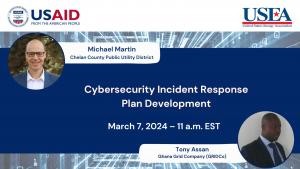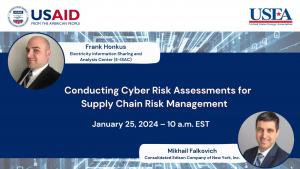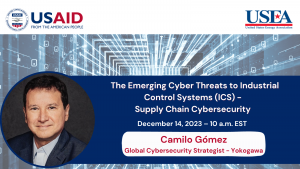March 21st, 2024
This webinar focuses on developing and maintaining organizational cybersecurity governance and the best practices on policies and procedures to address supply chain risk management. The webinar will highlight typical models for managing cybersecurity (e.g., the role of a CISO or CSO) and level of visibility into cybersecurity risks from the senior management to technical staff.
March 7th, 2024
An incident response plan (IRP) is an essential tool for utilities to prepare for an event and can help drive the utility’s overall cybersecurity activities. This webinar will discuss how utilities should incorporate supply chain cybersecurity considerations into an IRP: What are the typical steps to developing the incident response plan from identifying scenarios, identifying critical utility systems/assets, identifying supporting systems/assets, calculating business impacts, using existing risk analysis, and developing and testing playbooks.
February 22nd, 2024
Defensible architecture is the way that the utility should approach organizing their network, both enterprise and operational. Asset management supports this effort by maintaining insight into the assets on the organization’s network. This webinar covers best practices for utilities when developing defensible architecture and conducting asset management. The webinar will address the difference between planning for security during new deployment (e.g., integrating a distributed energy resources management system) vs.
February 14th, 2024
Join Mike Moore with industry experts Fred Eames and Chuck McConnell as we cover the ground on CCUS US Regulatory and Permitting issues going into 2024.
January 25th, 2024
This webinar focused on the risk management practices for supply-chain related cybersecurity risks including considerations for supply chain vulnerability management and equipment country-of-origin considerations. Risk management implies understanding threats, vulnerabilities, and potential impacts. Effective risk management also addresses prioritization, developing projects to mitigate risks, and evaluating the effectiveness of mitigations.
January 11th, 2024
In a world of increasing global cybersecurity threats, organizations need to understand the nature of the threats, as well as to recognize the role that organizations play in end-to-end supply chain cybersecurity in responding to them. Critical infrastructure like energy utilities often lack a workforce with specialized skills needed to address cyber security.
January 10th, 2023
The Women Energy Leaders (WEL) Program Opening Conference will feature a panel of women energy leaders from the United States, Southeast Asia, and the Pacific. The discussion will focus on the panelists’ professional journeys and reflections on the challenges they faced, programs or policies that have advanced their professional journey, and the role mentors played in supporting women in the workplace.
December 14th, 2023
In a world of increasing global cybersecurity threats, organizations need to understand the nature of the threats, as well as to recognize the role that organizations play in end-to-end supply chain cybersecurity in responding to them. Critical infrastructure like energy utilities often lack a workforce with specialized skills needed to address cyber security.
Pages









